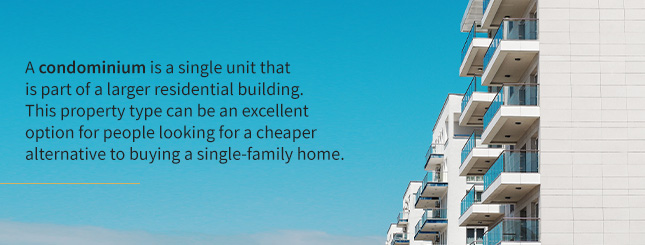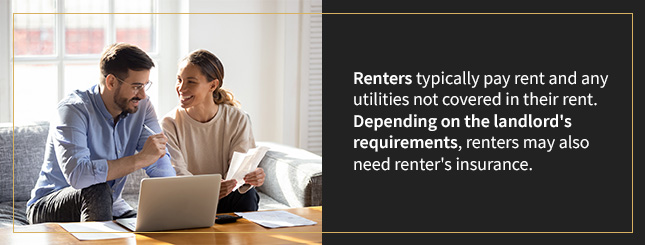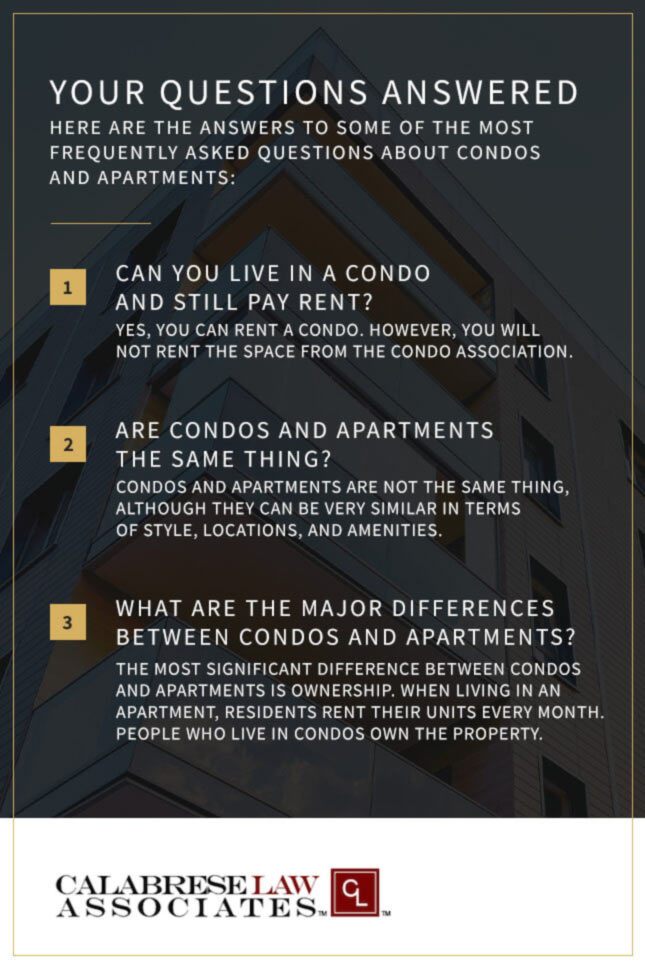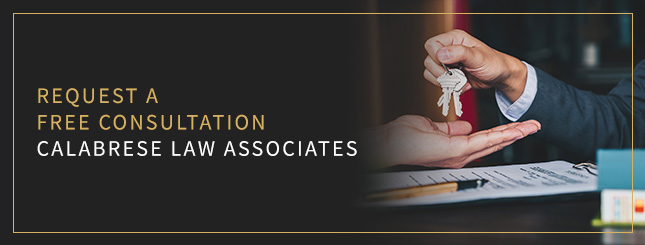Are you considering moving into a new building, but you are unsure which property type will be best for you and your needs? Before signing a lease or mortgage or loan note, you should understand both condos and apartments as well as how the two vary from one another.
Choosing your next home is not a decision you should take lightly. No matter what housing choice you decide on, it will impact your daily life for months and even years to come. Before agreeing to anything, familiarize yourself with the legal differences between renting and buying.
Because condominiums and apartments are often mistaken for each other and share a similar structure, it can be confusing to know exactly what you are getting with either one. Between amenities, costs, and rules, a lot goes into picking out a new home.
To help you fully understand and differentiate between condos and apartments, we share the legal considerations and pros and cons of living in both property types and how the two relate to each other. We’ve also compiled a list of commonly asked questions and their answers.
Questions? Contact Our Attorneys Now
What Are Condos?
A condominium is a single unit that is part of a larger residential building. This property type can be an excellent option for people looking for a lower-cost alternative to buying a single-family home. Condo communities or buildings are typically located in more urban and suburban areas. They are often located close to businesses, restaurants, and more populated areas. In rural areas, condos are far less common.
Also, note that condo owners do not have landlords. Instead, condominium unit owners typically pay their mortgage loan, utilities, and property taxes.
Do You Have to Pay HOA Fees if You Own a Condo?
Yes, you’ll need to pay HOA fees if you own a condo to pay for the upkeep of common areas. The cost of HOA fees depends on the quality and abundance of the condo community’s amenities and services.
Buying a condo is similar to buying a standalone house and begins with paying the down payment and closing costs plus a home inspection fee. Because of HOA fees and property taxes, in addition to the mortgage payment, condos tend to cost slightly more each month than renting an apartment.
Are the Common Areas of a Condo Legally Part of Your Home?
Condo owners are responsible for some individually owned parts of the condo, while other parts have joint ownership i.e. the “common areas”. Because condominium ownership can be more complicated than buying a single-family home where you own the house and the property, there are some legal considerations to take into account. Before buying a condo, the potential buyer and condo association should clearly understand property rights. Both parties should have a clear understanding of regulations about common areas.
Condo laws can be complicated, so it can be helpful to have a professional help you deal with disputes and answer questions. If you reside in or are looking to move to the Greater Boston Area, Calabrese Law Associates are experts in real estate and condominium law and can help familiarize you with your rights as a condo owner.
What Are Apartments?
Like a condo, an apartment is a single unit that is part of a larger residential building. Rental units are leased by a property manager or property owner landlord. Apartments are a great option for people searching for a place to live for a year or two. A typical apartment lease lasts for 12 months, and tenants pay rent every month. Some leases are month-to-month, meaning the tenant has more flexibility to move without breaching a contract.
Apartments are often located in small suburban areas and urban cities like condominiums. They are usually located near businesses, shops, restaurants, and parks.
Renters typically pay rent and any utilities not covered in their rent. Depending on the landlord’s requirements, renters may also need renter’s insurance. Usually, the landlord pays property taxes. Renters do not build equity while renting. Instead, the owner of the property builds equity.
For most apartments, landlords or property managers will take care of landscaping and maintaining common areas. When large appliances break, leaks happen, or other building problems occur, the landlord is typically responsible for the maintenance and costs of fixing such issues.
Legal Considerations for Apartment Living
When renting an apartment, the tenant should understand their rights to safe and livable housing first and foremost. When renting a place, you are entitled to the following:
- A roof that does not leak
- Heating
- Hot water
- Stable building structure
- Reasonable protection
- No environmental hazards like mold or lead
In most states, the implied warranty of habitability for renters protects them against negligent landlords or property managers. Under the implied warranty of habitability, building owners are responsible for the following:
- The building structure should be safe and intact from floor to ceiling.
- Common areas must be kept clean and maintained.
- Pests should be exterminated.
- Utilities such as plumbing, electricity, and heating should operate properly.
- Reasonable amounts of both cold and hot water need to be available.
- Drinkable water needs to be available.
- Both smoke and carbon monoxide detectors should be present in the unit.
Housing rules can vary from state to state, so you should research the laws in your specific region. For example, in Massachusetts, apartments need to comply with the Sanitary Code to be considered habitable. Massachusetts law also prohibits leases from requiring tenants to pay for repairs in areas of the building outside the apartment. Tenants in Massachusetts can’t be required to pay for repairs due to normal wear and tear on their apartments.
Your Questions Answered
Here are the answers to some of the most frequently asked questions about condos and apartments:
1. Can You Live in a Condo and Still Pay Rent?
Yes, you can rent a condo. However, you will not rent the space from the condo association. Instead, you will likely rent from the condo’s owner directly. In many cases, an individual homeowner needs approval from the HOA to rent out their condo.
2. Are Condos and Apartments the Same Thing?
Condos and apartments are not the same thing, although they can be very similar in terms of style, locations, and amenities. Condos are owned by individual residents, while apartments are rented from property owners. HOAs control common areas of condos. Landlords and property managers are responsible for apartments
3. What Are the Major Differences Between Condos and Apartments?
The most significant difference between condos and apartments is ownership. When living in an apartment, residents rent their units every month. People who live in condos own the property.
Costs
Apartment tenants pay for their rent and utilities each month. The lease will specify if any utilities are included in the monthly rent. The property manager or landlord is responsible for property taxes.
Condo residents will pay their monthly mortgage, utilities, HOA fees, and property taxes.
Rules
When living in an apartment, tenants need to abide by the rules set forth by their landlord or property manager. These rules are typically noted in the lease agreement.
Landlords can create rules regarding things like interior and exterior decor, pet requirements, noise, and even burning candles. If anyone in the apartment breaks the rules, it can lead to one of the following:
- Warnings: The tenant can receive a warning from the landlord about the rule break and further action if rules are continuously broken in the apartment.
- Fines: If tenants fail to adhere to the rules, landlords can issue fines.
- Eviction: When tenants are late with rent or breach the lease, landlords can evict the tenant.
Condo owners have a little more freedom. They are typically free to decorate and paint the interior of their unit without much regulation from the homeowner association. The HOA will often care for common spaces and landscaping around the residential building.
HOA regulations vary from community to community, but they can include rules regarding the following:
- Architecture
- Exterior decorations
- Noise
- Occupancy
- Pets
- Trash
- Parking
When it comes to breaking the rules, condo owners have more to lose than apartment renters. If residents break HOA rules, the association can foreclose the home in the most severe cases.
Amenities
Condo and apartments can have similar amenities. Typically, the better the amenities available to residents, the higher the monthly costs will be. For condo owners, their HOA fees will be higher depending on the quality of the amenities. For apartment renters, their monthly rent will be higher depending on amenities.
Common amenities for both condos and apartments include:
- Pools
- Playgrounds
- Fitness centers
- Off-street parking
- Designated dog areas
- Rooftop common areas
- In-unit washer and dryer
Maintenance
In an apartment, the landlord or property manager is responsible for maintaining both inside and outside the apartment. Problems with large appliances, leaks, and other issues, are handled and paid for by the landlord.
For condo owners, the condo association is typically responsible for outdoor maintenance such as landscaping and street cleaning. However, any maintenance inside the condo is the responsibility and at the cost of the owner.
4. What Are the Pros and Cons of Owning a Condo?
There are advantages and disadvantages to owning a condo.
The pros of owning a condo include:
- Equity: Condo owners build home equity.
- Costs: Owning a condo is typically less expensive than buying a single-family home.
- Less responsibility: HOAs are responsible for yard maintenance and exterior cleaning.
- Location: Condo buildings are often located in or near popular areas with shops and restaurants.
The cons of owning a condo:
- HOA fees: HOA fees can be costly.
- No land ownership: Even when you own a condo, you do not own any land.
- Rules: The HOA sets rules and regulations that condo owners must abide by to avoid fines or possible foreclosure.
5. What Are the Pros and Cons of Renting an Apartment?
Renting an apartment has its benefits and disadvantages.
The pros of renting an apartment:
- Flexibility: When renting an apartment, you have the flexibility to move when your lease is over. If you have a month-to-month agreement with your landlord, you have even more flexibility.
- Maintenance: When you rent an apartment, major maintenance is the responsibility of the landlord or property manager.
- Location: Apartment buildings are often located near popular areas such as downtowns and restaurants.
The cons of renting an apartment:
- Rules: Landlords set rules and regulations for inside the apartment. They can regulate pets, paint, and even what art can hang on the walls.
- No equity: When you rent an apartment, you do not build equity for yourself. Instead, you help build the equity of the property owner.
- Close to neighbors: When living in an apartment, you are often closely situated to your neighbors.
6. What Type of Attorney Should You Hire?
Look for an attorney with an understanding of landlord-tenant laws if you’re having an apartment dispute or issue with a landlord. Hire an attorney who understands condo laws if you have a problem with your condo’s HOA. Before hiring anyone, ask for examples of their previous experiences with cases like yours and how the cases were resolved.
7. How Are Legal Disputes in Condominiums vs. Apartments Different?
When living in a condo, you need to know how to handle disputes with the homeowners association properly. For renters, understanding how to deal with landlord-tenant disputes is equally important. The course of action for both housing types is a little different from one another.
Legal Disputes in Condos
Condo owners can often resolve minor conflicts with a conversation between neighbors or with the HOA. However, if the issue cannot be solved, it is time to review legal considerations. Revisit HOA regulations and see if the situation is covered in any community guidelines, then consider calling a condo attorney to help you understand your rights as a condo owner.
The next step is identifying everyone involved and contacting potential witnesses if other residents saw the incident. Collect evidence about the incident with as much detail as possible, from who initiated the incident to the boiling point of the issue. Note any inconsistencies as additional evidence in your case. Bring this information to your housing authority or a board member of the condo association.
If the dispute is not settled with mediation or arbitration, further legal action may be necessary. For more insight on legal disputes in condos, read our tips for resolving condo disputes on our blog.
Legal Disputes in Apartments
When renting an apartment, you may find yourself in a dispute with your neighbors or even your landlord or property manager. Like condo disputes, when incidents happen, it is best to attempt to settle them with a conversation. However, in more complex situations or when a resolution is difficult to find, the first step is to review the lease terms. Carefully go over your rights as a tenant and notify the person or people involved.
Some disputes will require mediation. If neither conversing nor mediation helps settle the case, it may be time to hire an attorney who understands landlord-tenant law.
Let Calabrese Law Associates Help With Apartment and Condominium Legal Matters
Before jumping into a lease or mortgage, renters and homeowners will benefit from understanding the distinction between property types. Knowing the legal differences between condos and apartments can help you make the best decision for you.
If you are located in the Greater Boston Area and are looking for an award-winning law firm that puts legal excellence, client service, and efficiency first, Calabrese Law Associates is here for you.
Need legal help with apartment or condominium legal matters? Request a free consultation with Calabrese Law Associates today.
This publication and its contents are not to be construed as legal advice nor a recommendation to you as to how to proceed. Please consult with a local licensed attorney directly before taking any action that could have legal consequences. This publication and its content do not create an attorney-client relationship and are being provided for general informational purposes only.
Attorney Advertising. Prior results do not guarantee a similar outcome.
” src=”data:image/gif;base64,R0lGODlhAQABAIAAAAAAAP///yH5BAEAAAAALAAAAAABAAEAAAIBRAA7″ alt=”








